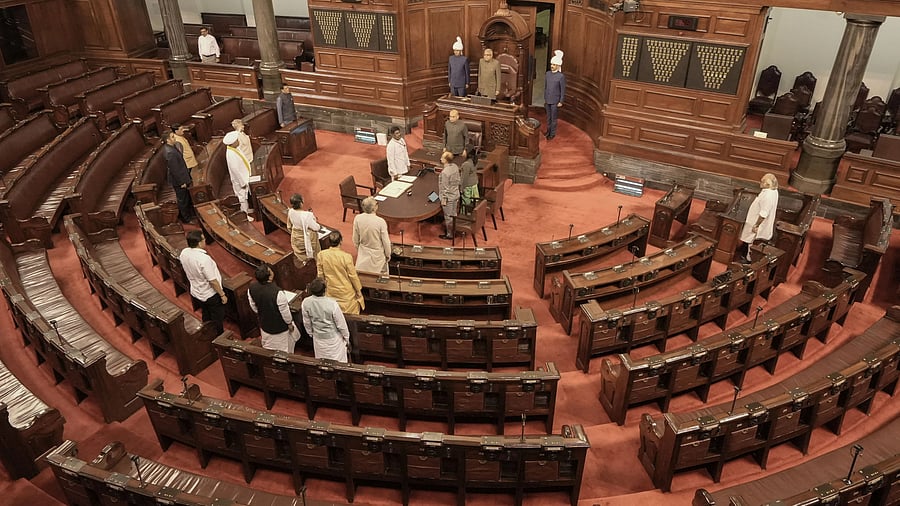
Representative image.
Credit: PTI Photo
Barely three weeks after a stormy monsoon session of parliament, the Modi government in a surprise move on Thursday announced its decision to convene a “special” five-day session of both Houses beginning September 18.
The announcement was made through a social media post by Union Parliamentary Affairs Minister Pralhad Joshi. “Special Session of Parliament (13th Session of 17th Lok Sabha and 261st Session of Rajya Sabha) is being called from 18th to 22nd September having 5 sittings. Amid Amrit Kaal looking forward to have fruitful discussions and debate in Parliament,” Joshi posted on X (formerly Twitter).
The online post triggered speculation on the legislative and political agenda for convening the Parliament on short notice after both Houses were adjourned sine die and prorogued.
BJP spokesperson Zafar Islam also held a press conference at the party office Thursday afternoon to underscore the “Amrit-kaal” tagline teased by the Parliamentary Affairs minister.
“Prime Minister Modi empowered the poor. Houses, power, and water were provided to those who did not have access to these amenities,” Islam said in a press conference at the party headquarters.
The Modi government has recently feted the success of the Chandrayaan-3 mission to iterate the larger theme of advancement made during the 9 years of the NDA rule. The session will be held days after the G20 summit in Delhi, which is being projected by the government as a sign of the rise in India’s international standing.
The speculations on the legislative agenda of the “special session” swirled around the legislative business that would have a strong political messaging ahead of the next general elections.
‘One Nation-One Election’ Bill, discussed in a section of the media, has been on the government agenda for a while. The proposed statute would provide for holding simultaneous elections for the Lok Sabha and state assemblies.
However, the passage of this law would require a constitutional amendment or a two-thirds majority in both Houses of Parliament.
Former Lok Sabha Secretary General P D T Achary said that any legislation to bring in the ‘one nation, one election’ system is not feasible Constitutionally, since it seeks to alter the basic structure of our federal system.
“There are two situations in which an assembly is dissolved – one, when a Cabinet decides to do so, and another method is when the President rules the dissolution. The President can do so only in dire situations, either when there is a breakdown of law in the state or the government has lost confidence or majority,” Achary said.
The government, however, is free to dissolve the Lok Sabha anytime before the expiry of the tenure, he added.
The last time a special session was held was in 1997 when P A Sangma was the Speaker of the Lok Sabha; the session was held to commemorate the Golden Jubilee year of Independence. Sources said that legislative officers had suggested such a special session in 2022 to celebrate the 75th year of Independence.
Sources in the government said that no question hour, zero hour or private member bills will be taken up, even though it remains unclear if the session could be held in the new Parliament.
The government, of late, has also been testing the waters on the Uniform Civil Code. The Law Commission of India in July this year started further consultations on a common civil code though an earlier published consultation paper has called UCC neither necessary nor desirable.
The Women’s Reservation Bill, introduced by the Manmohan Singh government, is also pending in the Rajya Sabha. The bill to reserve one-third of the seats in the central and state legislatures was introduced by the Congress, but Mandal parties like JD(U), RJD and SP — who are part of the I.N.D.I.A alliance — have opposed the bill in the current form.
The submission of the Justice Rohini Commission report on the sub-categorisation of OBCs submitted in July end after 16 extensions and six years is also being discussed in the political circles of meanings. The panel was formed to look into the apportioning of 27 reservations for a more equitable distribution of the quota pie, which is in sync with the BJP’s strategy to mobilize the minor OBCs, especially the most backward classes.
Congress, however, dismissed the announcement as an attempt to counter the I.N.D.I.A parties' meeting in Mumbai.
“For us, the only agenda in these five days will be to renew our demand for a Joint Parliamentary probe on the Adani group,” Jairam Ramesh, Congress General Secretary in charge of Communication said.
